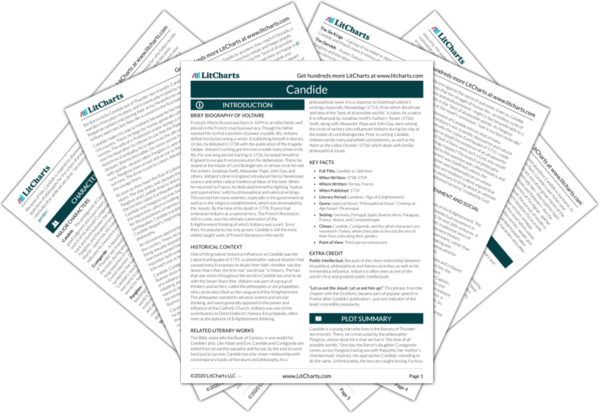Candide pits the optimistic doctrine of Pangloss—that we live in the “best of all possible worlds”—against the long and senseless series of misfortunes endured by Candide and the other characters. Candide begins the novel as a faithful student of Pangloss, but painful experience prompts him to reconsider his views. Candide's disillusionment is gradual. As he sees more of life and the world, he becomes less and less convinced that suffering and evil exist as part of a larger divine harmony. By the end, Candide comes to know that good is not always rewarded with good, that the New World is as filled with war and religious confusion as the Old, and that the best of intentions are no protection against the worst of outcomes. Even so, Candide suggests that the struggle of human life—an endless cycle of optimism and disillusionment—might in fact be preferable to a static faith in the “best of all possible worlds. As Pangloss concludes at the novel's conclusion, “man is not born to be idle.”
The disillusionment of Candide mirrors that of many Europeans in Voltaire's era. Scientific discoveries and natural disasters—especially the Lisbon Earthquake of 1755—made many people begin to doubt the existence of an all-powerful and infinitely good God: if there were such a God, why would he let such awful things happen? The branch of philosophy which tried to respond to this question was called theodicy, and its most famous proponent was Gottfried Leibniz, the historically real philosopher and mathematician on whose teachings those of Pangloss are modeled. Leibniz argued that evil existed because it was necessary to bring about an ultimate good, as part of a “pre-established harmony,” created by God.
Optimism and Disillusion ThemeTracker

Optimism and Disillusion Quotes in Candide
“It is demonstrable," said he, "that things cannot be otherwise than as they are; for all being created for an end, all is necessarily for the best end. Observe, that the nose has been formed to bear spectacles—thus we have spectacles. Legs are visibly designed for stockings—and we have stockings. Stones were made to be hewn, and to construct castles—therefore my lord has a magnificent castle; for the greatest baron in the province ought to be the best lodged. Pigs were made to be eaten—therefore we eat pork all the year round. Consequently they who assert that all is well have said a foolish thing, they should have said all is for the best.”
“If this is the best of possible worlds, what then are the others?”
“A hundred times I was upon the point of killing myself; but still I loved life. This ridiculous foible is perhaps one of our most fatal characteristics; for is there anything more absurd than to wish to carry continually a burden which one can always throw down? to detest existence and yet to cling to one's existence? In brief, to caress the serpent which devours us, till he has eaten our very heart?”
“You'll make a prodigious fortune; if we cannot find our account in one world we shall in another. It is a great pleasure to see and do new things.”
“What is this optimism?” said Cacambo.
“Alas!” said Candide, “it is the madness of maintaining that everything is right when it is wrong.”
“...but I own to you that when I cast an eye on this globe, or rather on this little ball, I cannot help thinking that God has abandoned it to some malignant being.”
“What signifies it," said the Dervish, "whether there be evil or good? When his highness sends a ship to Egypt, does he trouble his head whether the mice on board are at their ease or not?”
“I have only twenty acres,” replied the old man; “I and my children cultivate them; our labour preserves us from three great evils—weariness, vice, and want.”
“You are right,” said Pangloss, “for when man was first placed in the Garden of Eden, he was put there ut operaretur eum, that he might cultivate it; which shows that man was not born to be idle.”
“Let us work,” said Martin, “without disputing; it is the only way to render life tolerable.”
“All that is very well,” answered Candide, “but let us cultivate our garden.”
















